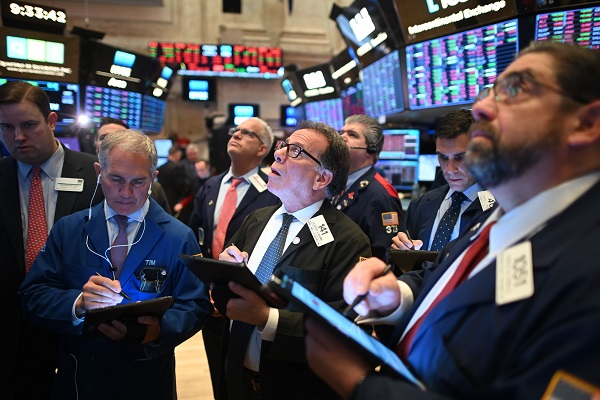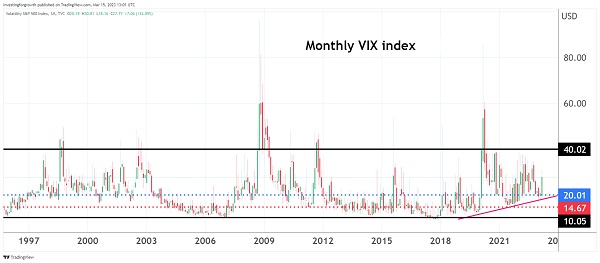Bank stock suspensions spread fear across financial markets
15th March 2023 12:36
by Graeme Evans from interactive investor
As Chancellor Jeremy Hunt delivered his Spring Budget, the FTSE 100 extended losses for the day to 3%. Our City writer explains what's behind the latest plunge in global stock markets.

Market anxiety deepened today as the spread of banking turmoil to Europe left the heavily sold FTSE 100 index back below where it started the year.
The latest heavy selling dashed hopes that the crisis involving tech lender Silicon Valley Bank (NASDAQ:SIVB) had been contained after three days of turbulence for global markets.
- Invest with ii: Share Dealing with ii | Open a Stocks & Shares ISA | Our Investment Accounts
London’s FTSE 100 rallied yesterday, but expectations for a steadier Budget day session were derailed in dramatic fashion by the suspension of trading in several European banking stocks.
The halt was triggered by a 20% slide for Credit Suisse (SIX:CSGN) shares to an all-time low after its leading Saudi shareholder declined more support for the troubled lender. Italy’s UniCredit SpA (XETRA:CRIN) and France's Societe Generale SA (EURONEXT:GLE) were also among those banks temporarily suspended Wednesday.
The developments deepened the global banking crisis, sending shares in Barclays (LSE:BARC) down 13p, or nearly 9% to their lowest level since January 2021 and continuing the slump for London-listed Standard Chartered (LSE:STAN), Lloyds Banking Group (LSE:LLOY) and NatWest Group (LSE:NWG).
- Silicon Valley Bank collapse sends Scottish Mortgage shares toward three-year low
- UK bank shares and what happens now after SVB’s collapse
- 3 great European shares for your ISA in 2023
The Europe-wide sell-off caused London’s top flight index to fall by more than 3% to below 7,400 for the first time since before Christmas. It had topped 8,000 less than a month ago, having started the year at 7,452.
The slump comes as traders worry that the collapse of Silicon Valley Bank signals that the lag effect of higher interest rates is now being felt.
These fears have darkened the economic outlook to leave Shell (LSE:SHEL) and BP (LSE:BP.) down 5% at levels last seen in early February, while miners including Glencore (LSE:GLEN) were also sharply lower today.
The slump comes amid an upturn in Wall Street’s fear gauge known as the Cboe Volatility index. The VIX has risen 36% over the past week and is heading back towards the levels seen in early October prior to the turnaround in stock market fortunes.
The index opened today above 28, whereas a position above 40 tends to be associated with a state of high fear such as during the early days of the pandemic.
- Insider: heavy buying after share slump at FTSE 250 tech firm
- Daily Trading Flash: 10 most-traded shares 15 March 2023
Volatility has been above 20 on a regular basis since the start of Covid, rather than returning to lower levels of 10-15 as it has done in the past following previous events including the dotcom crash or the financial crisis in 2008.

Today’s loss of confidence also hit mid-cap investors as the FTSE 250 index slid to its lowest level since December at 18,656, a fall of 472 points. Virgin Money (LSE:VMUK), Harbour Energy (LSE:HBR) and Tullow Oil (LSE:TLW) were among the biggest fallers.
On Wall Street, futures markets are pointing to a bleak session, with the Dow Jones Industrial Average set to open more than 500 points or 1.7% lower and the S&P 500 priced for a 1.75% decline. Both rallied yesterday on hopes the banking crisis had been brought under control.
These articles are provided for information purposes only. Occasionally, an opinion about whether to buy or sell a specific investment may be provided by third parties. The content is not intended to be a personal recommendation to buy or sell any financial instrument or product, or to adopt any investment strategy as it is not provided based on an assessment of your investing knowledge and experience, your financial situation or your investment objectives. The value of your investments, and the income derived from them, may go down as well as up. You may not get back all the money that you invest. The investments referred to in this article may not be suitable for all investors, and if in doubt, an investor should seek advice from a qualified investment adviser.
Full performance can be found on the company or index summary page on the interactive investor website. Simply click on the company's or index name highlighted in the article.